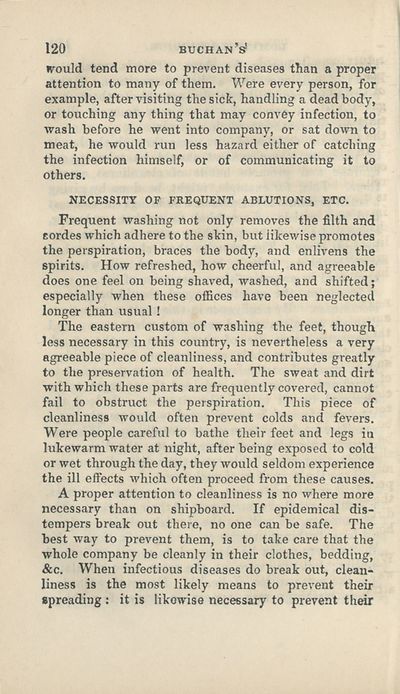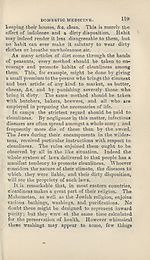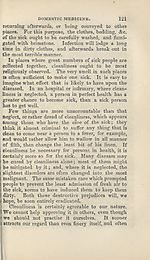Diseases > Domestic medicine
(154)
Download files
Complete book:
Individual page:
Thumbnail gallery: Grid view | List view

120 buchan’s!
Pould tend more to prevent diseases than a proper
attention to many of them. Were every person, for
example, after visiting the sick, handling a dead body,
or touching any thing that may convey infection, to
wash before he went into company, or sat down to
meat, he would run less hazard either of catching
the infection himself, or of communicating it to
NECESSITY OP FREQUENT ABLUTIONS, ETC.
Frequent washing not only removes the filth and
eordes which adhere to the skin, but likewise promotes
the perspiration, braces the body, and enlivens the
spirits. How refreshed, how cheerful, and agreeable
does one feel on being shaved, washed, and shifted;
especially when these offices have been neglected
longer than usual!
The eastern custom of washing the feet, though
less necessary in this country, is nevertheless a very
agreeable piece of cleanliness, and contributes greatly
to the preservation of health. The sweat and dirt
with which these parts are frequently covered, cannot
fail to obstruct the perspiration. This piece of
cleanliness would often prevent colds and fevers.
Were people careful to bathe their feet and legs in
lukewarm water at night, after being exposed to cold
or wet through the day, they would seldom experience
the ill effects which often proceed from these causes.
A proper attention to cleanliness is no where more
necessary than on shipboard. If epidemical dis¬
tempers break out there, no one can be safe. The
best way to prevent them, is to take care that the
whole company be cleanly in their clothes, bedding,
&c. When infectious diseases do break out, clean¬
liness is the most likely means to prevent their
spreading : it is likewise necessary to prevent their
Pould tend more to prevent diseases than a proper
attention to many of them. Were every person, for
example, after visiting the sick, handling a dead body,
or touching any thing that may convey infection, to
wash before he went into company, or sat down to
meat, he would run less hazard either of catching
the infection himself, or of communicating it to
NECESSITY OP FREQUENT ABLUTIONS, ETC.
Frequent washing not only removes the filth and
eordes which adhere to the skin, but likewise promotes
the perspiration, braces the body, and enlivens the
spirits. How refreshed, how cheerful, and agreeable
does one feel on being shaved, washed, and shifted;
especially when these offices have been neglected
longer than usual!
The eastern custom of washing the feet, though
less necessary in this country, is nevertheless a very
agreeable piece of cleanliness, and contributes greatly
to the preservation of health. The sweat and dirt
with which these parts are frequently covered, cannot
fail to obstruct the perspiration. This piece of
cleanliness would often prevent colds and fevers.
Were people careful to bathe their feet and legs in
lukewarm water at night, after being exposed to cold
or wet through the day, they would seldom experience
the ill effects which often proceed from these causes.
A proper attention to cleanliness is no where more
necessary than on shipboard. If epidemical dis¬
tempers break out there, no one can be safe. The
best way to prevent them, is to take care that the
whole company be cleanly in their clothes, bedding,
&c. When infectious diseases do break out, clean¬
liness is the most likely means to prevent their
spreading : it is likewise necessary to prevent their
Set display mode to:
![]() Universal Viewer |
Universal Viewer | ![]() Mirador |
Large image | Transcription
Mirador |
Large image | Transcription
| Antiquarian books of Scotland > Diseases > Domestic medicine > (154) |
|---|
| Permanent URL | https://digital.nls.uk/119889990 |
|---|
| Description | Thousands of printed books from the Antiquarian Books of Scotland collection which dates from 1641 to the 1980s. The collection consists of 14,800 books which were published in Scotland or have a Scottish connection, e.g. through the author, printer or owner. Subjects covered include sport, education, diseases, adventure, occupations, Jacobites, politics and religion. Among the 29 languages represented are English, Gaelic, Italian, French, Russian and Swedish. |
|---|

